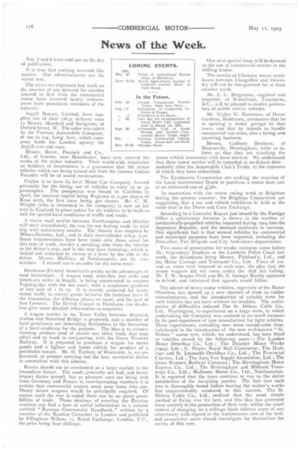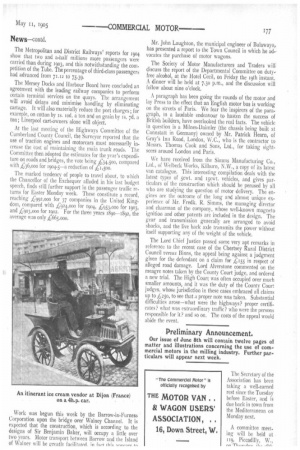News of the Week.
Page 4

Page 5

If you've noticed an error in this article please click here to report it so we can fix it.
Nos, 7 and 8 were sold out on the day of publication.
It is true that nothing succeeds like success. Our advertisements are the surest test.
The views we expressed last week on the absence of any demand for another journal to deal with the commercial motor have received hearty endorsement from prominent members of the industry.
Argyll Motors, Limited, have supplied one of their 1211.p. delivery vans to Messrs. Marshall and Snelgrove, of Oxford Street, W. The order was taken by the Farman Automobile Company, or too to 104, Long Acre, which company holds the London agency for Argyll cars and vans.
Messrs. Beyer, Peacock and Co., Ltd., of Gorton, near Manchester, have now entered the ranks of the motor industry. Their world-wide reputation as builders of locomotives is a guarantee that the motor vehicles which are being turned out from the famous Gorton Foundry will be of sound construction.
Ceylon is to have its local Motor Car Company, formed primarily for the hiring out of vehicles to carry 25 or 30 passengers. The prospectus was issued in Colombo in April, the nominal capital being R250,000 in 2,5oo shares of R100 each, the first issue being soo shares. Mr. C. M. Wright (who is interested in the company) is now on his way to England to place orders for six vehicles to be built to suit the special local conditions of traffic and roads.
A motor mail service between Northampton and Hitchin will start immediately, the van for use having made its trial trip with satisfactory results. The chassis was supplied by D
Milnes-aimler, Lt ., and is their four-cylinder 2oh.p. type. Some improvements have been made over those usual for this type of work, notably a speaking tube from the interior to the driver's seat, and in the rear door fastening, which is locked and unlocked by means of a lever by the side of the driver. MesErs. Mulliner, of Northampton, are the contractors. A second van is on order for the same route.
Honduras (Central America) is awake to the advantages of road locomotion. A wagon road, sixty-five feet wide and ninety-six miles in length, is being constructed to connect Tegucigalpa with the sea coast, with a maximum gradient at any part of i in 17. It is mainly projected for heavy motor traffic to convey goods between the terminal town in the mountains, the different places en route, and the port of San Lorenzo, The British Consul to Honduras can doubtless give some detailed information to enquirers.
A wagon service in the Teme Valley between Helmick station and Stamford Bridge is projected, and a number of local gentlemen are interesting themselves in the formation of a local syndicate for the purpose. The idea is to connect farming produce (and of course any other loads that may offer) and to work in conjunction with the Great Western Railway. It is proposed to purchase a wagon for heavy goods and a lighter and faster vehicle for produce of a perishable nature. Mr. H. Tayleur, of Worcester, is, we understand, at present carrying out the hon. secretarial duties in connection with this scheme.
Russia should not be overlooked as a large market in the immediate future. The roads generally are bad, and heavy import duties prevail, but as pleasure cars are being sent from Germany and France in ever-increasing numbers it is certain that commercial motors must soon come into use. Heavy steam wagons would be principally required. Of course until the war is ended there can be no great possibilities of trade. Those desirous of entering the Russian markets can find a host of useful information in a volume entitled " Russian Commercial Handbook," written by a member of the Russian Consulate in London and published by Effingham Wilson, ii, Royal Exchange, London, F..C., the price being four shillings. Our next special issue will be devoted to the use of commercial motors in the milling trades.
The service of Clarkson steam omnibuses between Llangollen and Oswestry will not be inaugurated for at least another week.
Mr. E. C. Bergensen, engineer and importer, of Waterfront, Vancouver, 13.C., will be pleased to receive particulars of public service vehicles.
Mr, Walter W. Bannister, of lIever Gardens, Maidstone, announces that he is opening a motor garage in that town, arid that he intends to handle conimercial van sales, also a hiring and repairing business.
Messrs. Cadbury Brothers, of Bourneville, Birmingham, write to inform us that they are watching the motor vehicle mcweinent with keen interest. We understand that their motor service will be extended at no distant date-probably after the Automobile Club's Trials, to the expenses of which they have subscribed.
The Eastbourne Corporation are seeking the sanction of the Local Government Board to purchase a motor dust cart at an estimated cost of 4.580.
In connection with the motor racing week at Brighton during the present summer, the Brighton Corporation are suggesting that a car and vehicle exhibition be held at the same time in the Dome and Corn Exchange.
According to a Consular Report just issued by the Foreign Office a satisfactory increase is shown in the number of mechanically-propelled vehicles imported during 1904 into the Argentine Republic, and the demand continues to increase. One significant fact is that several vehicles for commercial and municipal purposes have been imported, including the Post-office, Fire Brigade and City Ambulance departments.
Two cases of prosecution for smoke emission came before Mr. Stipendiary Hopkins at the Lambeth Police Court last week, the defendants being Messrs. Pickford's, Ltd., and the Motor Cartage and Transport Co., Ltd. Fines of tos. and 25. costs were imposed in each case, the plea that the motor wagons did not come under the 1878 Act failing. Mr. 'I'. W. Staplee Firth and Mr. E. George Mawby appeared to defend, and intimated that appeals would follow.
The advent of heavy motor vehicles, especially of the Motor Omnibus, has opened up a new channel of trade to rubber manufacturers, and the introduction of suitable tyres jotsuch vehicles has not been without its troubles. The anticipation of difficulties induced The St. Helens Cable Co., Ltd., Warrington, to experiment on a large scale, in which undertaking the Company was assisted in no small measure by its past experience of tyre manufacture for light vehicles. These experiments, extending over some considerable time, culminated in the introduction of the now well-known" St. Helens " motor tyre, which, we understand, has been fitted to vehicles owned by the following users :—The London Motor Omnibus Co., Ltd.; The Daimler Motor Works (1904), Ltd.; G. Hayes, Royal Mail Contractor ; The Hastings and St. Leonards Omnibus Co., Ltd.; The Provincial Carriers, Ltd. ; The Auto Van Supply Association, Ltd.; The Great Western Railway Company ; The Birmingham Motor Express Co., Ltd. ; The Birmingham and Midland Tramways Co., Ltd.; Mulliners Motor Co., Ltd., Northampton. It is reported that the tyres continue to run to the entire satisfaction of the foregoing parties. The fact that each tyre is thoroughly tested before leaving the maker's works has unquestionably conduced to this success. The St. Helens Cable Co., Ltd., realised that the most simple method of fixing was the best, and this idea has governed them entirely in the production of their tyre, whilst the novel system of charging on a mileage basis relieves users of any uncertainty with regard to the maintenance cost of the tyre, and prospective users should investigate for themselves the merits of this tyre. The Metropolitan and District Railways' reports for 1904 show that two and a-half millions. more passengers were carried than during 1903, and this notwithstanding the corn. petition of the Tube. The percentage of third-class passengers had advanced from 71.12 ta 75.39.
The Mersey Docks and Harbour Board have concluded an agreement with the leading railway companies to perform certain terminal services on the quays. The arrangement will avoid delays and minimise handling by eliminating cartage. It will also materially'reduce the port charges; for example, on cotton by is. tod. a ton and on grain by is. 7d. a ton; Liverpool cart-owners alone will object.
At the last meeting of the Highways Committee of the Cumberland County Council, the Surveyor reported that the use of traction engines and motorcars must necessarily increase the Cost of maintaining the main trunk roads. The Committee then adopted the estimates for the year's expenditure on roads antiloidges, the vote being .4;34,500, compared with ,36,000 for 1904-5—a reduction of £1,500.
The marked tendency of people to travel about, to which the Chancellor of the Exchequer alluded in his last budget speech, finds still further support in the passenger traffic returns for Easter Monday week. These constitute a record, reaching L:992,000 for 37 companies in the United Kingdom, compared with .4.924,000 for 1904, £953,000 for 1903, and £903,000 for 1902. For the three years 1890-1892, the average was only £66,000.
Mr. John Laughton, the municipal engineer of Bulawayo,. has presented a report to the Town Council in which he advocates the purchase of motor wagons.
The Society of Motor Manufacturers and Traders will discuss the report of the Departmental Committee on dutyfree alcohol, at the Hotel Cecil, on Friday the t9th instant. A dinner will be held at 7.30 p.m., and the discussion will follow about nine o'clock.
A paragraph has been going the rounds of the motor and lay Press to the effect that an English motor bus is working on the streets of Paris. We fear the inspirers of the paragraph, in a laudable endeavour to hasten the success of British builders, have overlooked the real facts. The vehicle in question is a Milnes-Daimler (the chassis being built at Cannstatt in Germany) owned by Mr. Patrick Hearn, of Gray's Inn Road, London W.C., who is the contractor to Messrs. Thomas Cook and Sons, Ltd., for taking sightseers around London and Paris.
We have received from the Simms Manufacturing Co., Ltd., of Welbeck Works, Kilburn, N.W., a copy of its latest van catalogue. This interesting compilation deals with the latest types of scwt. and isewt. vehicles, and gives particulars of the construction which should be perused by all who are studying the question of motor delivery. The engines are the outcome of the long and almost unique experience of Mr. Fredk. R. Simms, the managing director and chairman of the company, whose well-known magneto ignition and other patents are included in the design. The gear and transmission generally are arranged to avoid shocks, and the live back axle transmits the power without itself supporting any of the weight of the vehicle.
The Lord Chief Justice passed some very apt remarks in reference to the recent case of the Chertsey Rural District Council versus Binns, the appeal being against a judgment given for the defendant on a claim for L, 1[55 in respect of alleged road damage. Lord Alverstone commented on the meagre notes taken by the County Court judge, and ordered a new trial. The High Court was often occupied over much smaller amounts, and it was the duty of the County Court judges, whose jurisdiction in these cases embraced all claims up to £250, to see that a proper note w-as taken. Substantial difficulties arose—what were the highways? proper certificates? what was extraordinary traffic? who were the persons responsible for it? and so on. The costs of the appeal would abide the event.
























